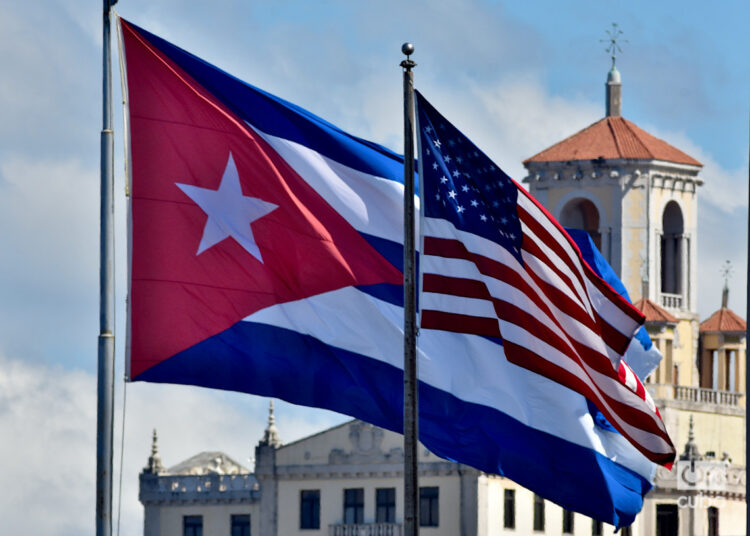Donald Trump signed a presidential memorandum this Monday that toughens U.S. policy toward Cuba and reverses what was put in place by former President Joe Biden.
The directive will enforce a legal ban on U.S. tourism to Cuba and strengthens the economic embargo, according to news sources, which also state that financial transactions to the island are restricted.
The memorandum “ends economic practices that disproportionately benefit the Cuban government, military, intelligence, or security agencies at the expense of the Cuban people,” the White House said in a statement, cited by EFE.
In this regard, the U.S. government — which had already reversed several Biden measures toward the island — prohibits “direct or indirect financial transactions with entities controlled by the Cuban military, such as Grupo de Administración Empresarial S.A. (GAESA), and its affiliates,” the statement specified.
However, the prohibition on transactions with Cuba does not include those related to aspects such as support for “programs to build democracy in Cuba,” “promoting national security or foreign policy interests of the United States,” and “supporting the sale of agricultural products, medicines, and medical devices,” according to U.S. law.
Regarding travel to the island, the document states that the “statutory ban on U.S. tourism to Cuba” will be enforced through regular audits and mandatory record-keeping of all travel-related transactions for at least five years.
In the case of educational trips, one of the types authorized for more than two decades, these must be carried out “sponsored by an organization subject to the jurisdiction of the United States, and said travelers must be accompanied by a representative of the sponsoring organization.”
Furthermore, the document notes that the Trump administration will not reinstate the so-called “wet foot, dry foot” policy — eliminated by Obama in January 2017 — and “amplifies efforts to support the Cuban people through the expansion of internet services, free press, free enterprise, free association, and lawful travel.”
In the case of telecommunications, it announces the convening of a working group by Secretary of State Marco Rubio to “assess the technological challenges and opportunities for expanding internet access in Cuba, including through federal government support for programs and activities that promote freedom of expression.”
The memorandum, which will take effect in the next 30 days, supports the reinforcement of the embargo against Cuba and opposes measures calling for an end to the embargo at the United Nations (UN) and other international forums.
The fact sheet also demands a review of human rights in Cuba, “including unlawful detentions and inhumane treatment, and requires a report on fugitives from American justice living in Cuba or being harbored by the Cuban government,” the U.S. government stated.
Cuba calls Trump’s move “criminal” and predicts repercussions
The Cuban government, for its part, accused the Trump Administration of “criminal conduct and violation of human rights” following the signing of the memorandum that tightens economic pressure measures against the island.
At the same time, it acknowledged that the country “will feel the impact” of the new directive, although it emphasized that it will not be able to “vanquish” it.
“The Presidential Memorandum against Cuba released this Monday by the U.S. government reinforces the aggression and economic blockade that punishes the entire Cuban people and is the main obstacle to our development,” denounced Cuban Foreign Minister Bruno Rodríguez on the social media platform X.
Likewise, the Cuban Foreign Minister emphasized in his message that “it is a criminal conduct and violates the human rights of an entire nation.”
El Memorando Presidencial contra #Cuba dado a conocer hoy por gobierno de EEUU refuerza la agresión y el bloqueo económico que castiga a todo el pueblo cubano y es el obstáculo principal a nuestro desarrollo.
Es una conducta criminal y violatoria de los #DDHH de toda una nación. pic.twitter.com/frXhNHFReK
— Bruno Rodríguez P (@BrunoRguezP) June 30, 2025
For his part, President Miguel Díaz-Canel considered that the Trump administration’s “new aggressive plan against Cuba” responds to “narrow interests” that do not represent “the majority in that country” and its objective is “to cause the greatest possible harm and suffering to the people.”
“The impact will be felt, but we will not be vanquished,” the Cuban leader asserted.
Other Cuban officials and diplomats also spoke out about the memorandum signed by Trump, blaming those who “have made their fortunes and political careers off the aggression against Cuba,” alluding to politicians such as current Secretary of State Marco Rubio.
For example, Deputy Foreign Minister Carlos Fernández de Cossío noted that the memorandum does not satisfy “any U.S. national security interest” and represents “no benefit to the well-being of Americans,” while maintaining that to justify its implementation, Washington “has had to resort, as always, to slander and lies.”
Meanwhile, Johana Tablada, Deputy Foreign Minister for the United States at the Foreign Ministry, wondered, “How can it be claimed that strengthening a criminal siege is helping the Cuban people?”
“Suffocation measures, aimed at destabilization, will fail in their primary objective of domination, but will cause even more pain to Cuban families here and there and also punish Americans,” she considered.
These new measures reverse the reversal by former President Joe Biden’s administration, which “eased pressure on the Cuban regime” regarding some of the restrictions Trump had imposed during his first term (2017-2021), according to the White House.










